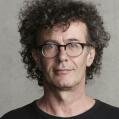The opera Project Inc.
Pestanyes primàries
Hola! El meu nom és Nigel Kellaway
In a career embracing his skills as an actor, director, dancer, musician and contemporary performance maker, Nigel Kellaway's initial professional performance training was in music, majoring in piano and composition at the universities of Melbourne and Adelaide.
He was the first Australian actor to train with Tadashi Suzuki and his Suzuki Company Of Toga (1984-85) and also worked with butoh artists Min Tanaka and Kazuo Ohno in Tokyo. Over 35 years, he has created more than seventy full length theatre, dance and music works with companies including The One Extra Company, Sydney Theatre Company, Entr'acte, Terrapin Puppet Theatre, Sidetrack Performance Group, Legs on the Wall, Ihos Contemporary Opera, the Australian Dance Theatre, Stalker, Calculated Risks Opera Productions, the Song Company, Splinters Theatre of Spectacle, Urban Theatre Projects and Stopera and for venues including Performance Space (NSW), the Perth Institute of Contemporary Arts (WA), The Royal Court Theatre (UK) and Centre Nationale de la Danse (France).
He was a co-founder, in 1987, of the performance ensemble The Sydney Front, which toured extensively within Australia and Europe, to the UK and Hong Kong.
Solo performance works include PERFORMER (1977), GIVE ME A ROSE TO SHOW HOW MUCH YOU CARE (1986), THE NUREMBERG RECITAL (1989), THIS MOST WICKED BODY (1994), a ten day, 240 hour performance marathon with percussionist David Montgomery, video artist Peter Oldham and restaurateur Gay Bilson, (which toured to the 1998 Telstra Adelaide Festival with pianist Gerard Willems and Gay Bilson), and SLEEPERS WAKE! WACHET AUF! (2007). He has also directed solo performances for artists including Clare Grant, Deborah Pollard, Erin Hefferon, Brian Fuata, Rakini Devi, Annette Tesoriero, Marisa Mastrocola and Alicia Talbot.
Over the past fifteen years a major focus of his work has been in contemporary music theatre. In 1997 he directed the Colin Bright/Amanda Stewart opera THE SINKING OF THE RAINBOW WARRIOR with the Song Company and Australysis for the Sydney Festival on Sydney Harbour, and in 2001 co-devised and directed LITTLE GEORGE, again with the Song Company. His collaborations with Canberra based Stopera have been dISTRESSING THE DIVA in 1998 and CANTATA in 2003.
In 1997 he co-founded with Annette Tesoriero The opera Project Inc., a loose ensemble of actors, musicians and physical performers dedicated to the mission of reassessing "opera" (and its accoutrement) as a contemporary performance practice. Major works by the company have been THE BERLIOZ - our vampires ourselves (1997, toured nationally in 2001), THE TERROR OF TOSCA (1998), TRISTAN (1999), EL INOCENTE (2001), ENTERTAINING PARADISE (2002), ANOTHER NIGHT: MEDEA (2003), THE AUDIENCE AND OTHER PSYCHOPATHS (2004), and THE RAMEAU PROJECT (2009).
He served on the dance committee of the Australia Council from 1993-96 and in 1997 was awarded the Rex Cramphorn Theatre Scholarship by the NSW Ministry for the Arts.
Kellaway has been a leader in the development of avant-garde and hybrid performance practices in Australia over the past three decades, and in 2004 was awarded a senior artist's Fellowship by the Theatre Board of the Australia Council to devote two years to his continuing research into theatrical, operatic and contemporary performance practices.
Kellaway continues his role as Artistic Director of The opera Project Inc. and also works widely as a freelance director, performer and mentor.
www.nigelkellaway.com
THE oPERA PROJECT Inc., in 10 major works over 15 years, has explored in multifarious ways the etymology of the word “opera” (its literal Italian meaning, “a work”) as well as its culturally implied meanings. It is a “project” in that it entails, first and foremost, an interrogation of form. Our concerns are in a theatrical practice in which music is but one contributing component. We stress that music can be visual and embodied, employing the spatial, visual and corporeal to challenge audiences ultimately to listen and watch anew.
We describe the defining qualities of theatre simply as “fast and slow, loud and soft bits”. We employ music as a stage direction and tempo indication. It becomes the dramaturgical, emotional and rhythmic backbone to the work, not merely a structural order. Here is an “abstract” means working against “interpretation” of a theatrical moment, against spoon-feeding the audience a particular view or understanding. There exists a kind of polyphony and counterpoint – a multiplicity of conjunctions and confrontations.
We employ our performers in a kind of melodrama: a language allowing an exact grammar and lexicon of emotional display, imagining a time before the private world made a fetish of our emotional lives. Our shattered pieces are gathered together in an act of pure, abbreviated display.

